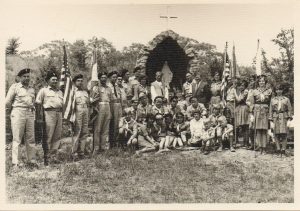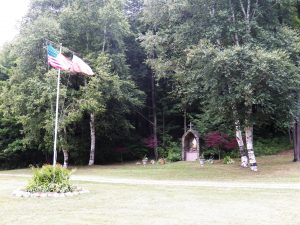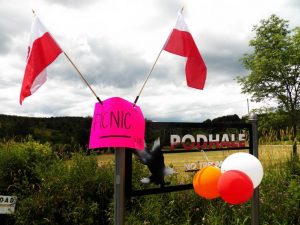At the end of the Second World War, a new wave of Polish immigrants and refugees began to settle in Western New York. Wanting to create their own spaces, where they could spend time and share their experiences amongst themselves, these Poles began starting their own clubs and organizations. Their efforts led to the establishment of the Polanie Club, the Polish Saturday School, the Polish Combatants’ Association Post 33, and the revitalization of the Adam Mickiewicz Library and Dramatic Circle. As this wave began to have children a desire grew amid their ranks to recreate the Polish Scouting experience, and to carve out a bit of the Polish landscape in Western New York. To this end, the Markuts, Zwolaks, Kisluks, Fundalinskis and other families banded together in the early 1960s and on July 13, 1967 incorporated the Podhale, Parents and Youth Association Inc.
 With Podhale these families wanted to not only create “cultural and educational facilities with the intention of spreading the Polish language among the youth” and “[expand] further efforts in educational facilities” all year long, but also to see Poland be free again and craft the future leaders of the Polish people. Many of these founders had already sacrificed greatly to free Poland from the Nazis. Krystyna Fundalinski a machinist who smuggled gun parts, served as a nurse in the Polish Underground Army, was part of the 1944 Warsaw Uprising, wounded with a piece of shrapnel that she carried from Poland, to Germany, and finally America where it was removed. Even founders who were children during the war had harrowing ordeals. Ludmila Skowronek was sent by the Soviets to Siberia at age 9. After she was granted amnesty in 1942, she shuttled from Iran to India to the Kidugala Polish refugee camp in Tanzania, before moving to Great Britain after the war. In Buffalo she would help to not only establish Podhale but would serve on its board of directors for a number of years.
With Podhale these families wanted to not only create “cultural and educational facilities with the intention of spreading the Polish language among the youth” and “[expand] further efforts in educational facilities” all year long, but also to see Poland be free again and craft the future leaders of the Polish people. Many of these founders had already sacrificed greatly to free Poland from the Nazis. Krystyna Fundalinski a machinist who smuggled gun parts, served as a nurse in the Polish Underground Army, was part of the 1944 Warsaw Uprising, wounded with a piece of shrapnel that she carried from Poland, to Germany, and finally America where it was removed. Even founders who were children during the war had harrowing ordeals. Ludmila Skowronek was sent by the Soviets to Siberia at age 9. After she was granted amnesty in 1942, she shuttled from Iran to India to the Kidugala Polish refugee camp in Tanzania, before moving to Great Britain after the war. In Buffalo she would help to not only establish Podhale but would serve on its board of directors for a number of years.
 Formally organized, Podhale now had to find itself a home and camp. The Adam Mickiewicz Library and Dramatic Circle would serve as a base of operations for a number of years, while through the efforts of Chester Zwolak and Alina Kisluk, a 100 acre farm would be found and secured in Franklinville. The early years of Podhale saw not only the development of the camp and the scouting system, but the organization fostering relationships with other postwar immigrant associations like Post 33 with their annual Name’s Day party, “Kaziuk”, as well as the organizations of greater Polonia like the Pulaski Parade committee.
Formally organized, Podhale now had to find itself a home and camp. The Adam Mickiewicz Library and Dramatic Circle would serve as a base of operations for a number of years, while through the efforts of Chester Zwolak and Alina Kisluk, a 100 acre farm would be found and secured in Franklinville. The early years of Podhale saw not only the development of the camp and the scouting system, but the organization fostering relationships with other postwar immigrant associations like Post 33 with their annual Name’s Day party, “Kaziuk”, as well as the organizations of greater Polonia like the Pulaski Parade committee.
 In Franklinville the Parents and Youth Association built a canteen, a chapel shrine, outdoor facilities, and began leasing out property to families who wanted to build cabins. They also built strong relationships with similar Polish Scouting organizations across the U.S. While Podhale still held solo events like outings to Corning and Watkins Glen, banquets, and theatrical productions; they also held joint ventures like indoor “komineks” with scouts from Rochester, NY, and three Ontario cities: St. Catherine’s, Hamilton, and Burlington. Podhale also participates in the annual Niagara-On-The-Lake pilgrimage with other scouts.
In Franklinville the Parents and Youth Association built a canteen, a chapel shrine, outdoor facilities, and began leasing out property to families who wanted to build cabins. They also built strong relationships with similar Polish Scouting organizations across the U.S. While Podhale still held solo events like outings to Corning and Watkins Glen, banquets, and theatrical productions; they also held joint ventures like indoor “komineks” with scouts from Rochester, NY, and three Ontario cities: St. Catherine’s, Hamilton, and Burlington. Podhale also participates in the annual Niagara-On-The-Lake pilgrimage with other scouts.
Over the years Podhale has created and cultivated one of Western New York Polonia’s defining summer events with their annual picnic in Franklinville. The picnic is a two-day celebration of all things Polish with music, dancing, food and drink, games, fireworks, and a Catholic Mass.
Do you have any stories or memories about this location of the Polonia Trail? We would love to hear it! Please send us your story, and if it is chosen, it will be added to the site.
Send Your Story